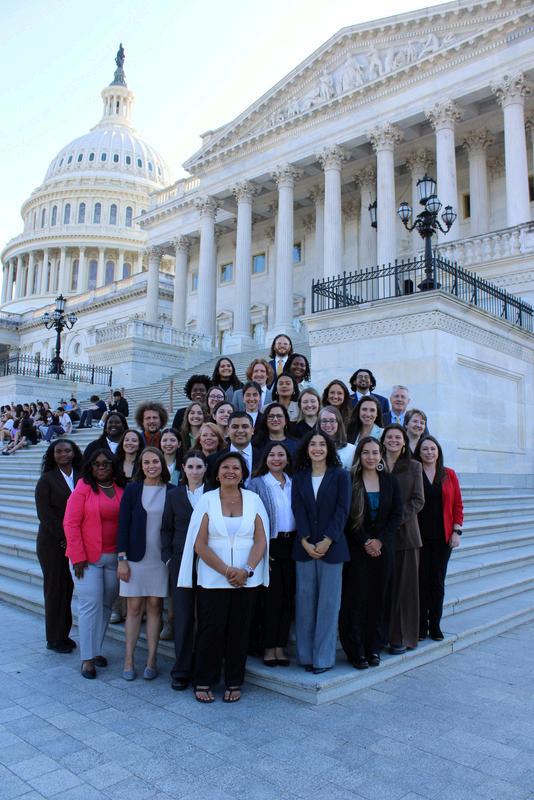
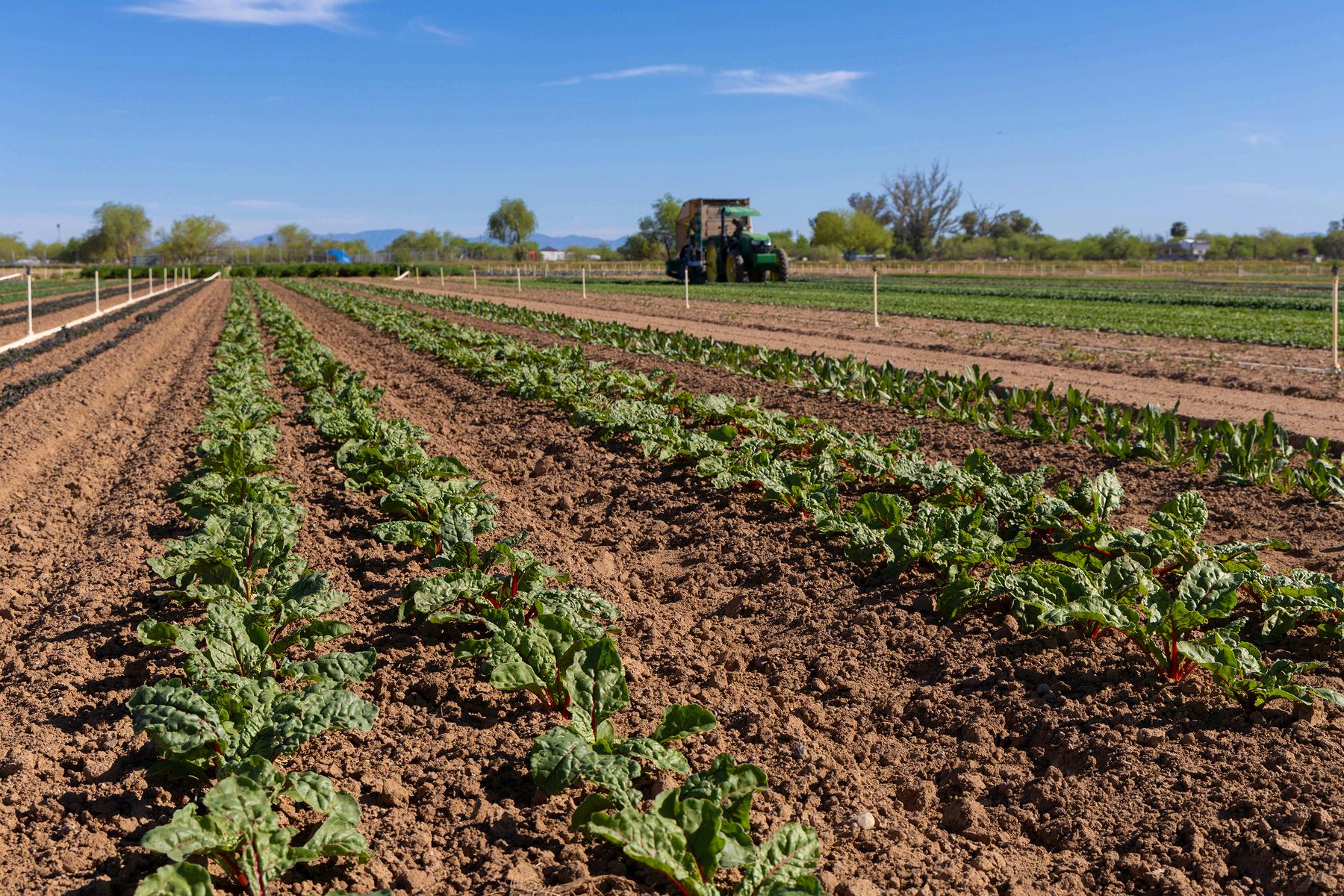
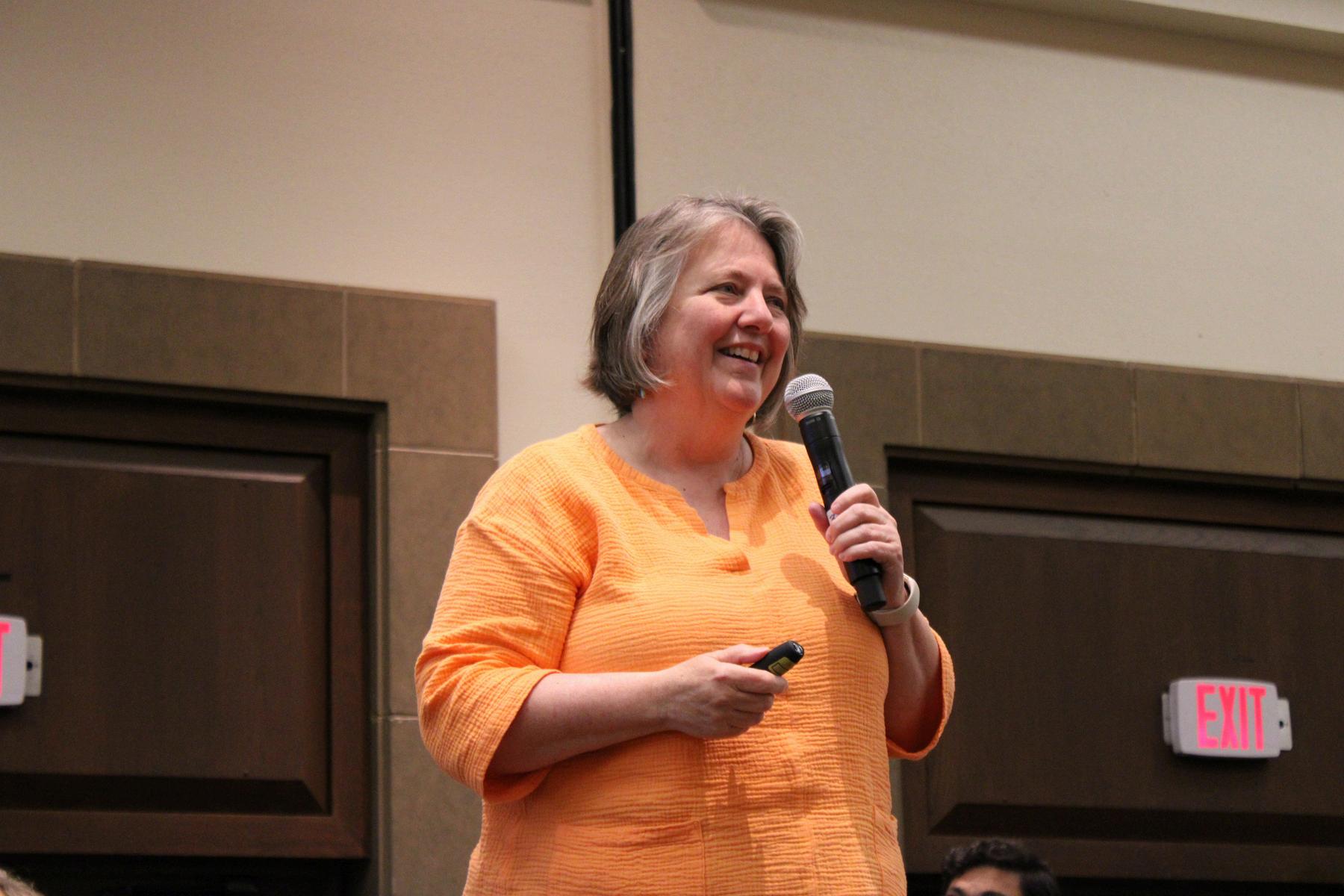
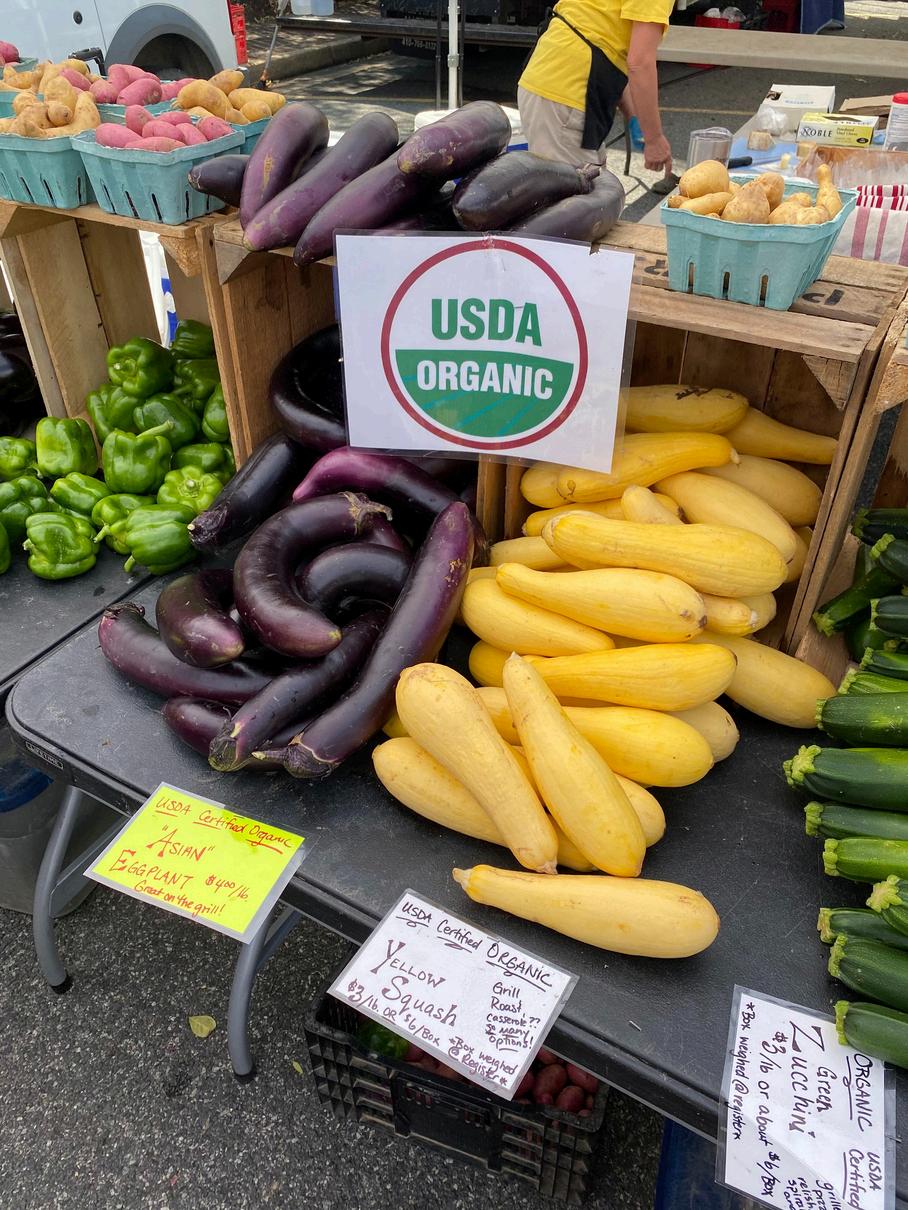

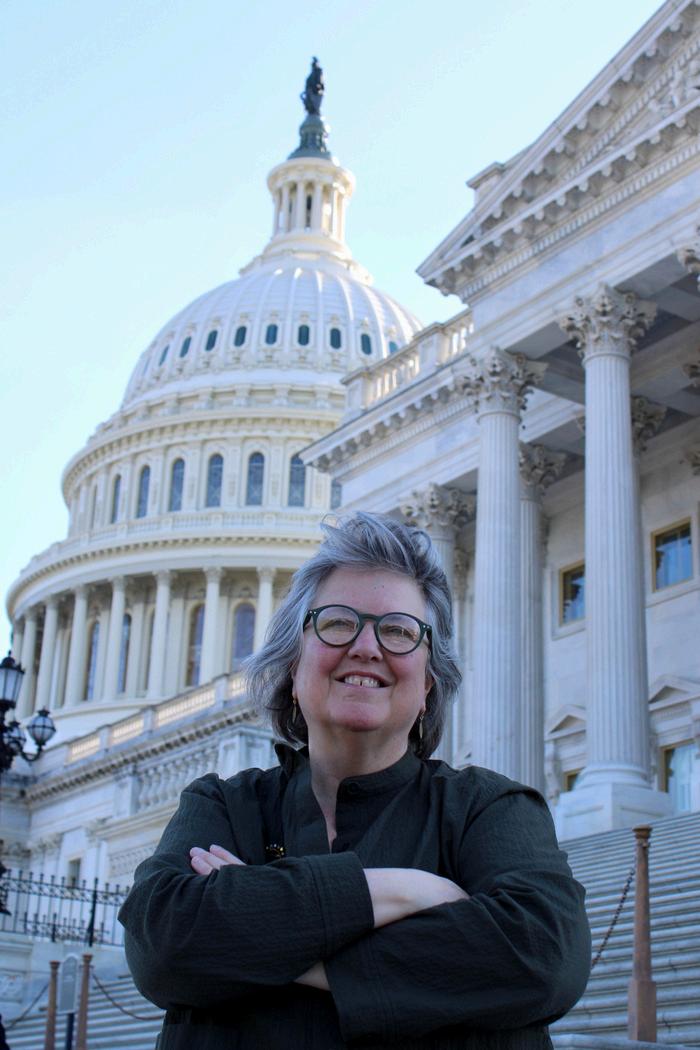







5 years ago…
ASU President Michael Crow was in recruiting mode, telling me about this innovative and ambitious university and the generous gift from Kelly and Brian Swette All great, but what really got me? He closed with the ASU Charter:
ASU is a comprehensive public university, measured not by whom it excludes, but by whom it includes and how they succeed; advancing research and discovery
of public value; and assuming fundamental responsibility for the economic, social, cultural and overall health of the communities it serves.
We established the Swette Center for Sustainable Food Systems and choose our strategic priorities with the ASU Charter front of mind
We committed to educating NextGen leaders who truly reflect the incredible diversity of our country. We prioritized food policy research, understanding that food system transformation depends upon government laws, regulations, and investments. And we identified key community collaborators with whom to work on a range of critical issues.
We hope you enjoy reading this snapshot of our work and accomplishments. To keep abreast with our many efforts, please visit our website and follow us on social media
On behalf of myself and my very talented and passionate team of coworkers, thank you for your support.

Kathleen A. Merrigan, PhD
Kelly
& Brian Swette
Professor of Sustainable Food Systems, School of Sustainability Executive Director, Swette Center for Sustainable Food Systems
N
In the dynamic landscape of global food and agriculture, the Swette Center for Sustainable Food Systems at Arizona State University has emerged as a beacon of progress, sustainability, and innovation over the past five years
Led by Kathleen Merrigan, former Deputy Secretary and COO of the U S Department of Agriculture, the Swette* Center was established in 2018 with a vision to address the pressing challenges facing our food systems through research, education, and community engagement. Among its many accolades, Food Tank has ranked the Swette Center as one of the top organizations transforming food systems for four consecutive years
From groundbreaking research that pushes the boundaries of food accounting to educational programs that empower the next generation of food policy leaders, this report encapsulates the Swette Center’s multidimensional impact through the lens of seven strategic priorities
As we celebrate the successes of the past five years, we acknowledge that the journey toward sustainable food systems is ongoing. The challenges that lie ahead demand continued dedication and innovation This report not only serves as a testament to the accomplishments of the Swette Center but also as a roadmap for the future
Join us in reflecting on the past, envisioning the future, and embracing the collective responsibility we share in creating a more sustainable food system
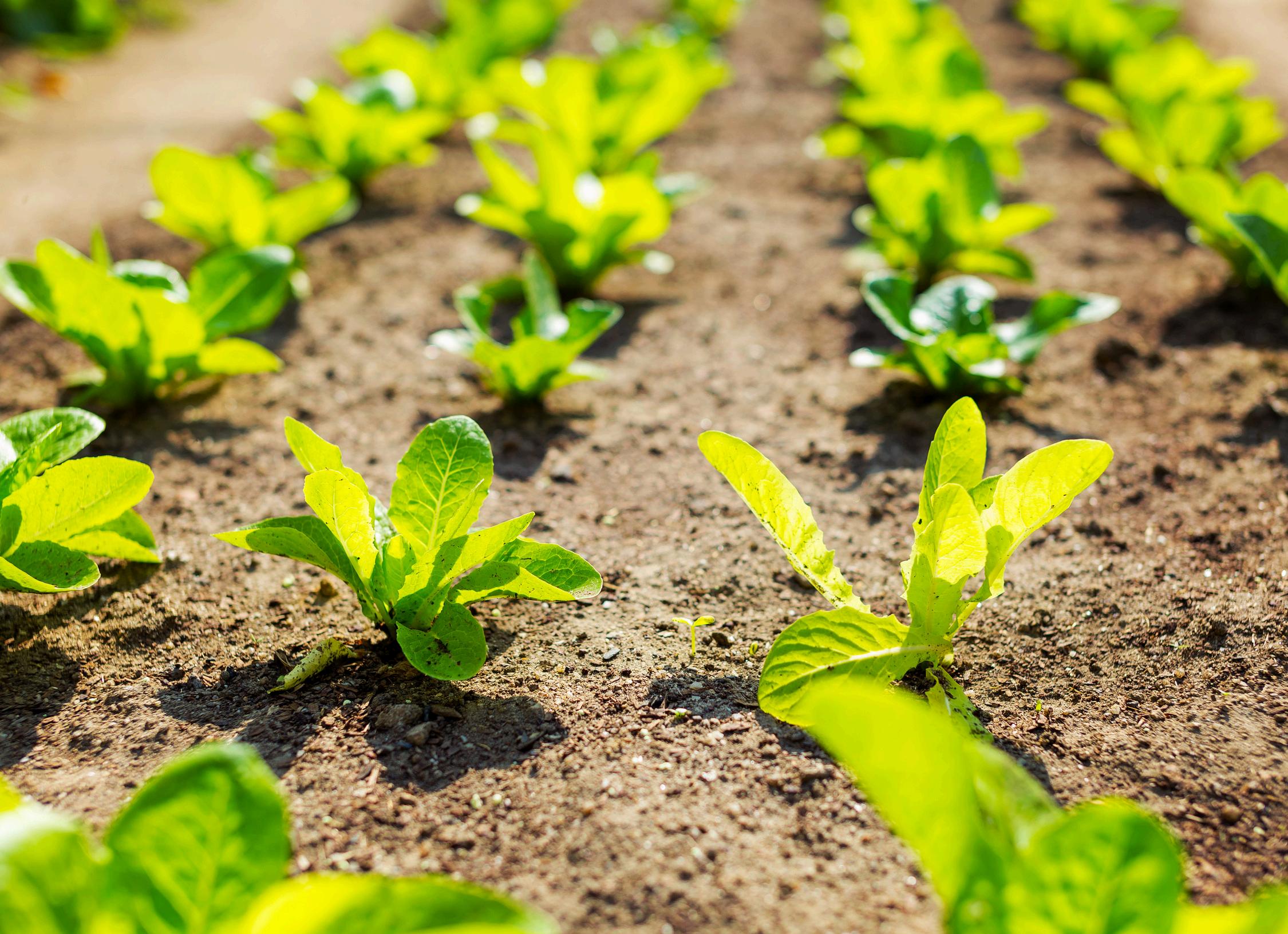
By providing comprehensive education and immersive experiences, we equip diverse leaders with the knowledge and skills to address complex challenges and shape the future of sustainable food systems
By influencing policy and conducting research, we support organic practices, ultimately contributing to the health of ecosystems, consumers, and those who produce our food.
By exposing hidden costs within food systems, we create greater transparency for decisionmakers to enable them to make informed choices that consider broader implications.
By collaborating with producers and community stakeholders, we create a more robust, equitable, and locally resilient food system for the benefit of all Arizonans.
By partnering with culinary experts, we strive to make sustainable food choices the most sought-after, demonstrating that sustainability and deliciousness can go hand in hand.
By lifting up Indigenous voices, we support food sovereignty and foster a deeper understanding and appreciation of the contributions of Indigenous foodways to sustainability.
By demystifying government programs and regulations, we support industry efforts to adopt sustainable practices, responsible sourcing, and ethical business models.
Transforming food systems requires a new generation of diverse leaders, trained in food policy and steeped in sustainability. Kathleen Merrigan joined ASU in August 2018 and immediately set to work to design a suite of new ASU degree programs and bolster a lone undergraduate certificate in sustainable food systems As a faculty member, her primary focus has been, and will continue to be, graduate training We are convinced that ASU is on a trajectory of having the most sought-after and impactful graduate programs in sustainable food systems in the country within the next 3 years
2024 Accelerated M S in Sustainable Food Systems
In 2023, the Swette Center, in partnership with the University of AlaskaFairbanks, Hawai’i Pacific University, University of Guam, and FoodCorps, received an $18.5 million grant to create a pipeline of diverse young leaders trained and ready for jobs in the food and agriculture sector, particularly at the United States Department of Agriculture (USDA).

Funded through this grant, the USDA NextGen program at ASU is providing generous scholarships, paid internships, and ample networking opportunities for students in sustainable food systems academic programs. The Swette Center launched this program in the fall 2023 semester with 31 scholarships for graduate students, totaling to $83,252 in financial aid through USDA NextGen. Undergraduate scholarships and internships are set to roll out in spring 2024 alongside the hire of a new Swette Center project manager.
A key feature of this program is the prioritization of underserved students by designating no less than 75% of scholarship funds for Indigenous, Native American, Alaska Native, Native Hawaiian, Pacific Islander, Asian, Hispanic, Black, Multiracial, and First-Generation college students. With this commitment, we are improving accessibility to our academic programs and ultimately diversifying the food and agriculture workforce.

The Swette Center is the foremost U.S. university think tank on organic agriculture policy, bar none.
Organically grown food is known for its positive and profound impact on human and planetary health, economic vitality, and social equity, but still represents just 6% of all food sold in the United States. To help expand organic, the Swette Center has produced three significant reports that have resulted in numerous policy changes. Additionally, we are leading the country’s data collection and Arizona’s initiatives in the USDA Transition to Organic Partnership Program (TOPP).
Over the past five years, our unwavering commitment to advancing organic agriculture and shaping policies has yielded remarkable results. Through extensive research reports, transition assistance, and collaborative initiatives, we have increased support for organic farms locally in Arizona and across the United States.
Key accomplishments in our first 5 years
3
8
15 reports transdisciplinary partnerships with organizations policy recommendations enacted since 2021
54
$1,986,747 awarded to support TOPP efforts
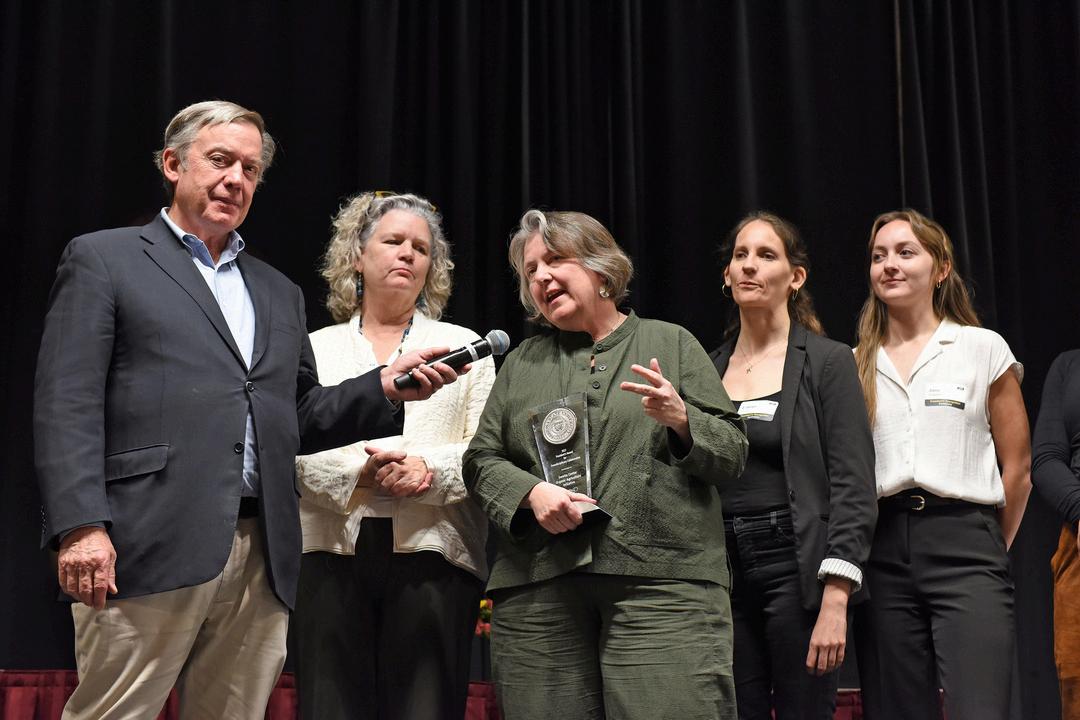
In recognition of our work advancing organic, the Swette Center was a proud recipient of the 2023 ASU President’s Award for Transdisciplinary Collaboration


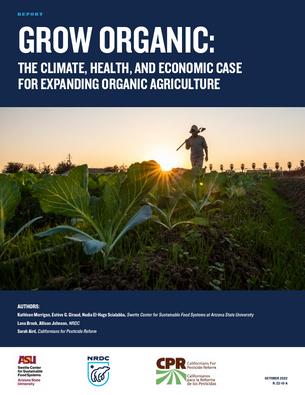
True cost accounting (TCA) of food is a comprehensive and innovative methodology designed to go beyond the conventional price tag of agricultural products This approach considers factors such as environmental degradation, public health implications, and social equity, offering a holistic perspective that enables policymakers and consumers to make more informed decisions TCA serves as a powerful tool in shaping practical policy solutions, fostering transparency, and promoting a food system that values long-term sustainability over short-term economic gains
The Swette Center has been at the forefront of TCA research and is a trailblazer in TCA methodology. We recently published a groundbreaking TCA study on cow-calf operations in the Western United States. We also completed a Starbucks-sponsored TCA study of dairy milk and alternative plant-based beverages and are working on a Kaiteki Center (Mitsubishi)-sponsored TCA study of edible oils.

Through collaboration with Colorado State University, our study assessing ranching in Arizona and Colorado resulted in our first TCA research report, Unveiling the Hidden Capitals of Cow-Calf Operations in the Rangelands of the West. This report documents the complexity of analyzing ranching in the West and provides monetary estimates that capture key benefits and costs in cattle production
Additionally, the insights from this study were recognized with a publication in the peerreviewed journal PLOS One The article can be accessed at bit ly/true-cost-of-beef
TCA was the central focus of The State of Food and Agriculture 2023 report published by the Food and Agriculture Organization of the United Nations, confirming that the true cost of American food is $3.2 trillion, or three times what Americans actually pay. Kathleen Merrigan was pleased to advise FAO on this report that underscores the critical necessity of incorporating hidden costs into decision-making processes for the transformation of food systems.

While the Swette Center’s work stretches well beyond Arizona, we are dedicated to supporting our home state’s food system which faces many challenges, including an arid climate and water scarcity. However, Arizona also presents opportunities for innovative approaches to promote sustainable food production and distribution. The Swette Center has significant work underway on urban agriculture with the City of Tempe and has been funded by USDA to lead climate-smart agriculture and transition to organic activities across the state.

Featuring 26 speakers and over 200 Arizonans in attendance, the Arizona Department of Agriculture and the Swette Center co-hosted the 4th Annual Arizona Food Summit at ASU’s Mountain America Stadium in 2022 for two days of information sharing and discussion on how best to move forward on creating a sustainable, healthy food system for all Arizonans The Center had the privilege of hosting US Secretary of Agriculture Tom Vilsack as the featured speaker

case studies, our research team is developing 10 policy recommendations that factor in local residents’ feedback and aim to pave the way for the development of a Tempe food plan
We recognize that not everyone will change their diet solely for personal and/or planetary health reasons. We must harness the power of deliciousness and the joy of food to accomplish our sustainability goals. In pursuit of this, the Swette Center collaborates with chefs and food innovators to reimagine food, perceptions, and processes that drive sustainable and fulfilling food consumption

Delicious sustainable foods add variety to diets, helping to prevent malnutrition and enhance health outcomes. Inspired by this connection, the Swette Center led a study that surveyed 150+ students at ASU’s College of Global Futures about their experiences with hunger and food insecurity while pursuing their degree. The report, Student Food Insecurity, contains an indepth analysis of the data collected, staff and faculty points of view, and our recommendations for institutional support
In 2020, the Swette Center partnered with Compass Group and Google Food to train over 200 chefs on the connection between sustainability, nutrition, food choices and planetary health. The virtual learning series was named RePlant Your Menu with a focus on teaching chefs how to create more plantforward menus that are simultaneously delicious and beneficial for both people and the environment
Once training was complete, the chefs went back to their kitchens to review menus and see where more plant-forward options and diverse ingredients could be incorporated

The Swette Center’s work is grounded in the firm belief that no future can be sustainable if it does not respect and draw from the culture and traditions of Indigenous Peoples. Indigenous foodways represent the culmination of centuries of wisdom, culture, and sustainable practices They are the embodiment of Indigenous communities' deep connection to their lands, traditional knowledge, and ancestral heritage
The Swette Center works in Hawai'i to support Indigenous farming strategies as a way to improve nutrition security One focus of our efforts and research is on traditional native Hawaiian fishponds, which can provide self-sufficiency to a region that currently imports 63% of its commercial seafood The Center also works with Native American farmers in Arizona, a population that constitutes nearly 60% of all Arizona food producers. Our work with Indigenous foodways is respected for its integrity and we have only scratched the surface of what can be done in partnership with Indigenous Peoples.
The Wisdom of Indigenous Foodways: An evening of listening and learning
2020 Food Tank Summit, hosted at ASU and convened by the Swette Center, Food Tank, and the University of Hawaiʻi – West Oʻahu

22 >350 featured speakers attendees in-person >1000 attendees on livestream
This summit brought Indigenous voices to the forefront of the conversation about transforming our food system. In recent generations, Indigenous communities have made great strides toward revitalizing cultural foods As food policy leaders, the Swette Center is dedicated to listening to Indigenous Peoples, standing with them, and including them in decision-making on land that they have sustained for thousands of years.
Engaging businesses, including food producers, retailers, agricultural technology providers, and investors, brings valuable expertise and innovation capabilities that are essential for driving sustainable change Collaboration between governments, civil society, and the private sector can leverage the strengths of each sector to build resilient and inclusive food systems Partnerships between the Swette Center and industry (e.g., Starbucks, MyLand, Aramark, Danone, Google, Mitsubishi, and the Organic Trade Association) are well underway.

In 2022, The Swette Center created A Guide to USDA Grants and Loans to simplify the USDA's numerous funding opportunities for the business community. This comprehensive guide provides clear descriptions and direct hyperlinks to various grants and loans available for private businesses.
Over the past five years, we have invited professionals from private businesses to attend and speak at many events hosted by the Swette Center in the ASU building in Washington, DC Th fi t i 2019 t th t f i t ti

The Swette Center is the focal point for food systems work at ASU Through our research, academic programs, and community engagement efforts, the relationships we have built with our students and partners are long-lasting Our commitment to creating the future of food is strong and deeply rooted in our values
Empowering the next generations through cutting-edge research, education, and policy
ASU sustainability scientists and scholars connect and collaborate with global food producers distributors and consumers to solve pressing food systems
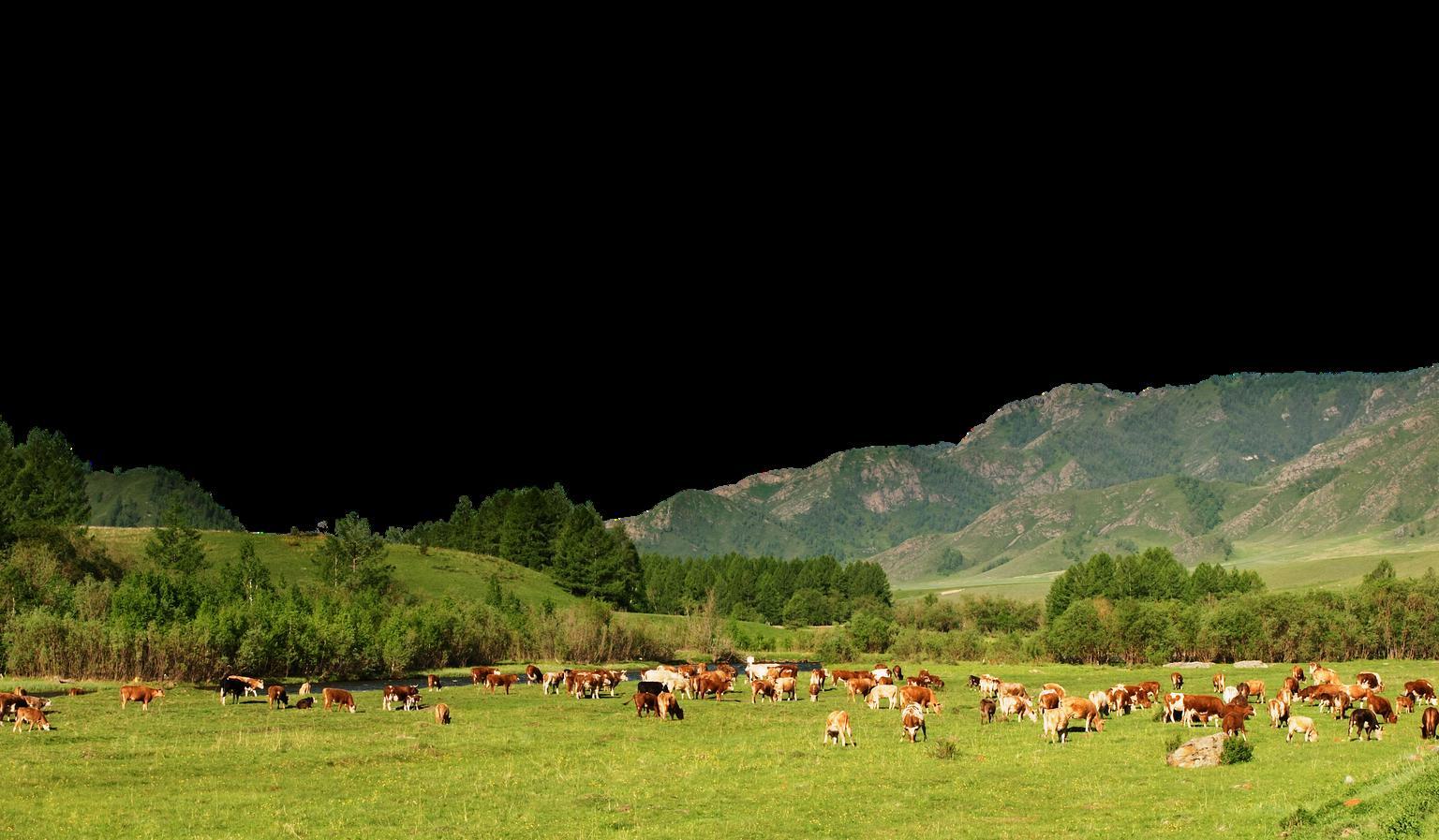
We are perpetual students cultivating an inviting environment of curiosity, critical thinking, and networking
In its initial year, just two staff, Executive Director Kathleen Merrigan and Director of Strategic Initiatives Suzanne Palmieri, launched the Swette Center and together built the foundation of what we are today Overtime, 23 people have staffed the Swette Center, of whom 9 hold or will soon hold master or PhD degrees in food systems from the ASU School of Sustainability In addition to our staff, the Center employs student workers throughout the year
Dr. Mauricio Bellon
Nicholas Benard
Courtney Buzzard
Jane Coghlan
Dr Jesse Dart
Ethan Ellis
Dr Sara El-Sayed
Deb Eschmeyer
Arthur Getz
Dr. Estève Giraud
Colleen Hanley
Ariel Kagan
Kūʻikeokalani Kamakea-Ohelo
Sarah Lemon
Erica Martin
Dr. Kathleen Merrigan
Dr. Mukunth Natarajan
Dr. Gina Nichols
Kate Otto
Suzanne Palmieri
Elizabeth Reilly
Sharla Strong
Carly Wyman
In addition to staff, five faculty members from various schools and centers have joined the Swette Center’s core team, working closely with Center staff to execute our ambitious agenda: Prof. Joe Dobrow, Dr. Melissa Nelson, Dr. Andrea Rissing, Dr. Chris Wharton, and Dr. Arianne Cease
The Swette Center harnesses cross-campus expertise by networking faculty, identifying research opportunities, sharing strategies and policy developments, and uniting faculty in common pursuit of food systems transformation. In this way, the Swette Center serves as the fulcrum of ASU food systems work. Over 100 faculty have chosen to affiliate with the Swette Center, and the list continues to grow.
Senior fellows are extraordinary leaders with distinguished careers On a part-time basis, they mentor staff and students and participate in the Center’s research and engagement activities
Nadia El-Hage Scialabba, former Senior Environment Officer for FAO of the United Nations, currently a sought-after food systems consultant based in Rome, Italy
Catherine Greene, former Senior Agricultural Economist in USDA’s Economic Research Service
Ferd Hoefner, former Senior Strategic Advisor and Policy Director for the National Sustainable Agriculture Coalition, current Principal at Farm, Food, Environment Policy Consulting
Mark Killian, rancher and former Director of the Arizona Department of Agriculture and Speaker of the House of Representatives
Pam Marrone, serial entrepreneur and renowned STEM leader, current Chair of the Invasive Species Corporation, Primary BioAg Innovations, and Global Bioag Linkages
Alexander Müller, former State Secretary of the German Federal Ministry of Consumer Protection, Food and Agriculture, Co-founder of the Green Party, and current Managing Director of TMG, ThinkTank for Sustainability in Berlin, Germany
Bob Nash, former Under Secretary for USDA’s Rural and Community Development
Ricardo Salvador, Director and Senior Scientist of the Food and Environment Program at the Union of Concerned Scientists
Malik Yakini, Co-founder and Executive Director of the Detroit Black Community Food Security Network
A C K N O W L E D G E M E N T S
As we reflect on the journey of the past five years, the Swette Center for Sustainable Food Systems is grateful for the collaborative spirit and unwavering support that has propelled us forward in our mission to create a more sustainable food future.
We extend our deepest gratitude to our dedicated team members, current and former, whose passion and dedication have been the driving force behind the Center's initiatives.
A special thanks to our esteemed senior fellows and affiliated faculty, whose guidance and strategic vision have played a pivotal role in shaping the direction of the Swette Center.
We are indebted to our partners and collaborators from academia, industry, government, and the non-profit sector Your willingness to share knowledge, resources, and expertise has fostered a rich tapestry of ideas and solutions To our donors and supporters, we express our sincere appreciation for your generosity and belief in our mission
We also want to acknowledge the producers and communities that have welcomed us into their spaces, shared their insights, and collaborated with us on the ground Your commitments to sustainability inspire us and reinforce the importance of our work.
To the broader community that has followed our progress, attended our events, and engaged with our research, thank you for your interest and support. It is through these connections that we amplify our impact and bring about positive change.
Lastly, none of our work would be possible without the generous gift from Kelly and Brian Swette (pictured right) which established our Center Their visionary philanthropy laid our foundation, enabling us to pursue innovative solutions for the benefit of livelihoods, human health, and ecosystem integrity

The Swette Center is a part of the School of Sustainability and the Global Futures Laboratory, an initiative committed to use-inspired research and service to the global community in which we live. Research at ASU is rooted in innovation, service, and impact, reflected in ASU’s ranking from the National Science Foundation as the top university for transdisciplinary research. Additionally, ASU is widely recognized as the #1 university in the U S for innovation, #1 for sustainability practices, and #1 for addressing the UN SDGs.
C O N T A C T
Swette Center for Sustainable Food Systems
Mailing address: Arizona State University PO Box 878204 Tempe, AZ 85287-8204
Website: globalfutures asu edu/food/
Physical address: Walton Center for Planetary Health 777 E. University Drive Tempe, AZ 85281
Email: foodsystems@asu edu
Social media: linktr ee/foodsystemsasu
